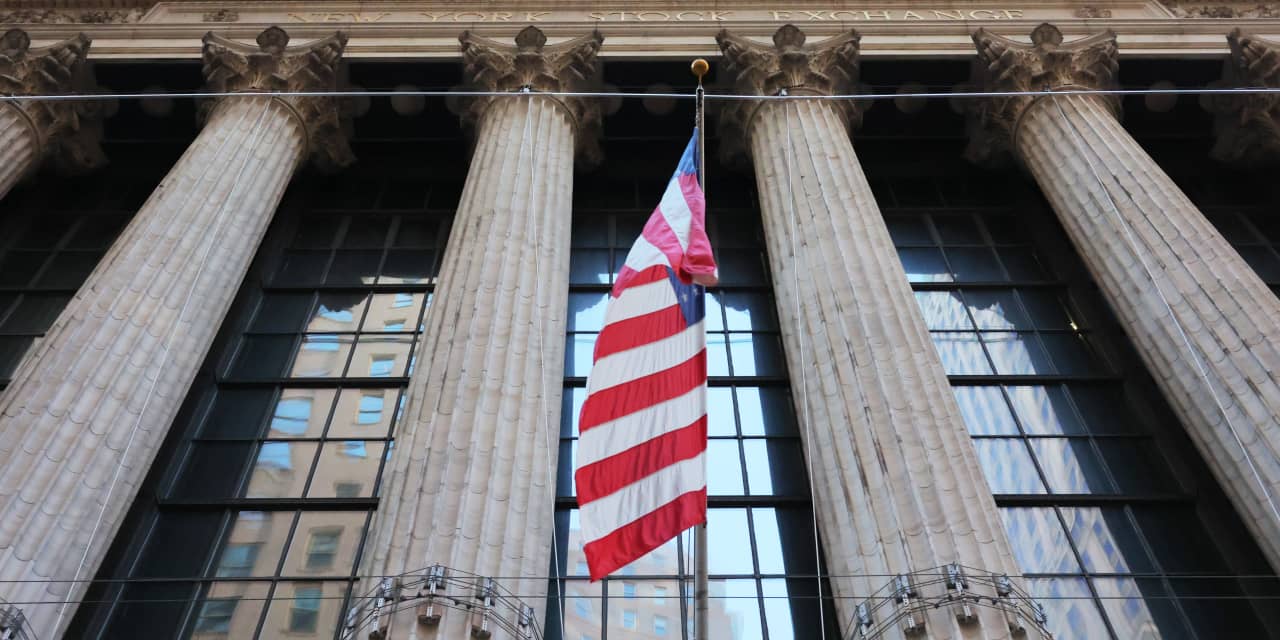U.S. stocks finished mixed on Monday ahead of the next major inflation update and a possible federal government shutdown later this week.
What happened
-
The Dow Jones Industrial Average
DJIA
finished up by 54.77 points, or 0.2%, at 34,337.87, its highest closing level since Sept. 20, according to Dow Jones Market Data. -
The S&P 500
SPX
closed down by 3.69 points, or almost 0.1%, at 4,411.55. -
The Nasdaq Composite
COMP
ended down by 30.36 points, or 0.2%, at 13,767.74.
On Friday, the Dow, S&P 500 and Nasdaq Composite had all climbed to score back-to-back weekly gains.
What drove markets
A cautious tone prevailed to start the new week as investors waited for the U.S. consumer-price-index report for October, due on Tuesday, which has the ability to underpin the recent bull run seen in U.S. stocks or to bring it to a halt.
The Dow Jones had jumped 5.8% over the two weeks that ended last Friday, helped by benchmark borrowing costs
BX:TMUBMUSD10Y
falling swiftly from 16-year highs on hopes inflation can ease further and that the Federal Reserve is done with interest-rate increases.
Treasury yields finished little changed on Monday, with the rate on the 10-year note at 4.631%, as investors and traders shifted into wait-and-see mode.
Read: Stock-market rally faces make-or-break moment. How to play U.S. October inflation data.
Economists expect core CPI growth — a measurement that strips out volatile items such as food and energy — to remain steady at 0.3% month over month, though Wall Street sees the likelihood of a higher-than-expected annual core rate of 4.2%.
See: This week’s October inflation data looms large on Washington’s economic radar
The producer-price report for October will be published on Wednesday. October retail-sales data is also on the docket this week and will offer further clues to the health of the consumer on Wednesday.
“We obviously have a big inflation data print tomorrow and think markets will generally get what they’re looking for, which is a slow decline in headline inflation,” said John Luke Tyner, a portfolio manager at Alabama-based Aptus Capital Advisors, which manages about $5 billion. “But there’s still a tug of war playing out, with markets getting ahead of the Fed and betting on inflation coming down faster than expected and on rate cuts occurring sooner rather than later.”
Meanwhile, worries over a dysfunctional government contributed to Moody’s Investors Service cutting its outlook on the U.S. sovereign credit rating to negative from stable late Friday.
While the decision by Moody’s is “important,” the possibility of a partial shutdown of the federal government this week is what’s leading to a “more jittery feel” in markets, Tyner said via phone on Monday.
Analysts see a 40% chance that a government shutdown will occur.
Also see: House Republicans look to pass two-step package to avoid partial government shutdown
“We don’t see the decision by Moody’s as having a large and immediate impact on the view the global investment markets hold for U.S. Treasurys,” said Brent Schutte, chief investment officer at Milwaukee-based Northwestern Mutual Wealth Management. “However, it’s important to remember that the country’s annual interest costs on servicing its debt are rising.”
With interest payments taking up more resources in the budget, “it is likely borrowing costs will become an issue that restricts future government spending,” Schutte wrote in weekly commentary distributed on Monday. “This could mean that we may see an erosion of the ultra favorable backdrop for risk-taking that has existed over much of the prior decade.”
Investors will also be keeping an eye out for reports from retailers, including Home Depot Inc.
HD,
on Tuesday, Target Corp.
TGT,
on Wednesday and Walmart Inc.
WMT,
on Thursday, as third-quarter earnings season comes to an end. Their comments on the health of the consumer may also play into thinking about the Fed.
Earnings Watch: Retail earnings begin this week. ‘It’s getting worse,’ an analyst says.
Through last Friday, 92% of S&P 500 companies had reported third-quarter results, according to FactSet. Of those that reported, 81% saw a positive surprise on earnings, while 61% reported a positive surprise on revenue. The year-over-year growth rate for the S&P 500 in the third quarter was on track to come in at 4.1%, according to FactSet, which if realized would mark the first quarter of positive year-over-year growth since the third quarter of last year.
The U.S. budget deficit narrowed in October, data showed on Monday.
Companies in focus
-
Shares of Dow component Boeing Co.
BA,
+1.10%
finished 4% higher after a flurry of news. Bloomberg reported Monday that the Chinese government is close to lifting a freeze on commercial sales of the U.S. company’s 737 Max aircraft. Elsewhere, long-haul carrier Emirates announced at the Dubai Airshow that it would buy $52 billion of the Boeing planes, and SunExpress, a joint venture between Turkish Airlines and Lufthansa
LHA,
+1.69% ,
said it would purchase 90 of the 737 Max jets. -
Shares of Nvidia Corp.
NVDA,
-1.72%
closed up by 0.6% after the company introduced its new artificial-intelligence chip. -
Collective Audience Inc. shares
CAUD,
-3.50%
ended 19.2% lower, weighed down by its blank-check merger with digital marketing business DLQ, which was a unit of Logiq.
Jamie Chisholm contributed.
Read the full article here











Leave a Reply